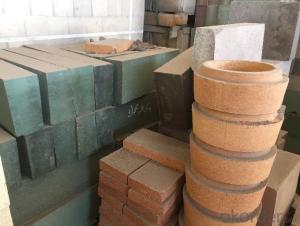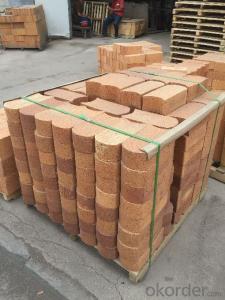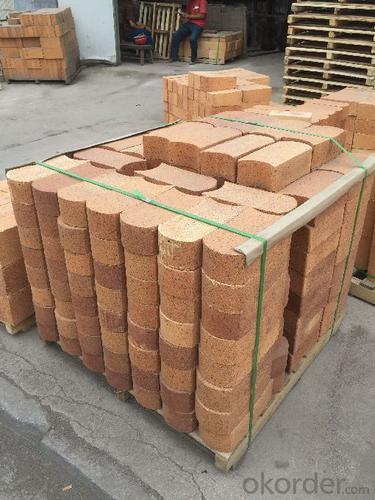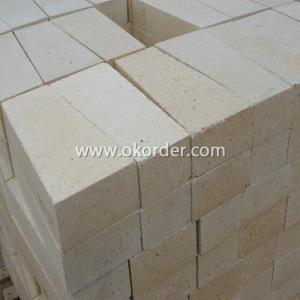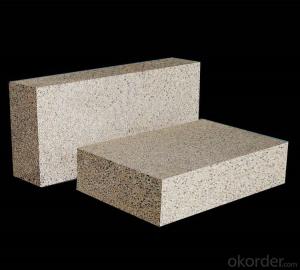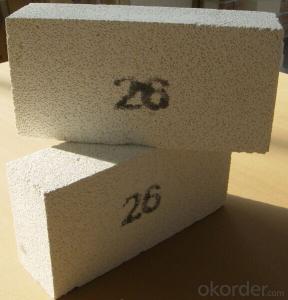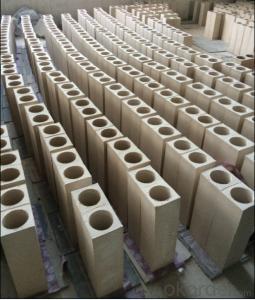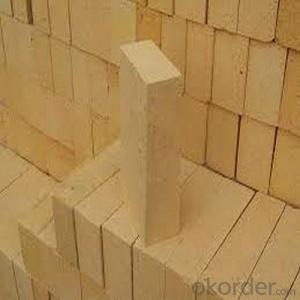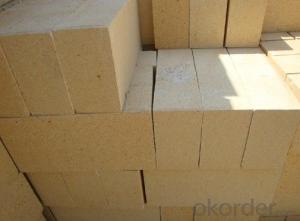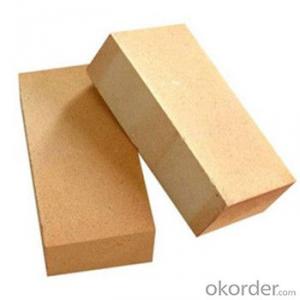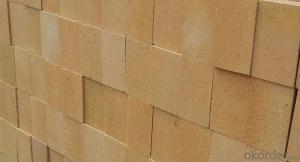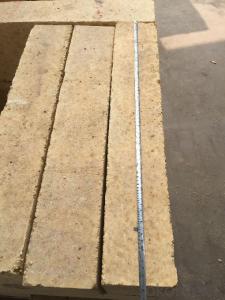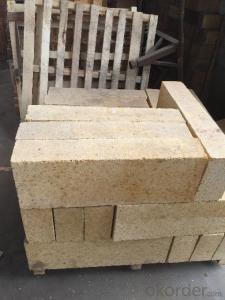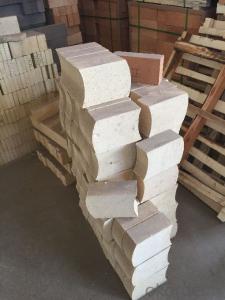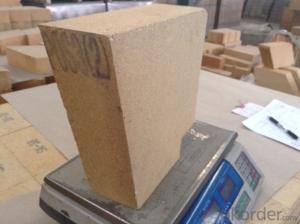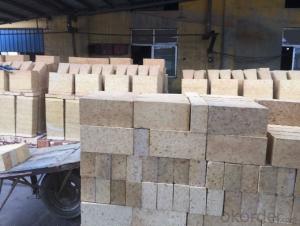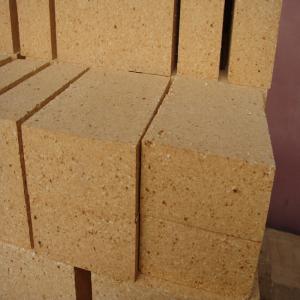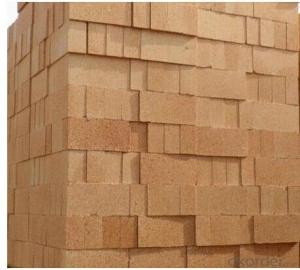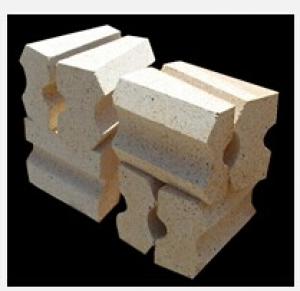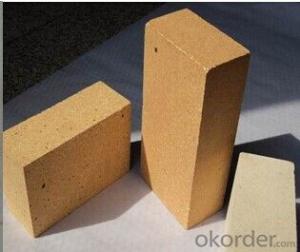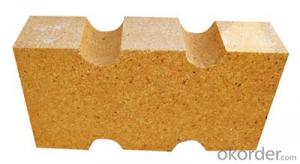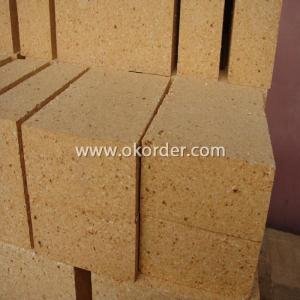High Alumina Fireclay Brick (Al2O3 37%)
- Loading Port:
- Qingdao
- Payment Terms:
- TT OR LC
- Min Order Qty:
- 17 m.t
- Supply Capability:
- 10000 m.t/month
OKorder Service Pledge
OKorder Financial Service
You Might Also Like
General Information
CMAX high alumina firebricks are classified according to alumina content ranging from 48% to 90%.
Feature
Low thermal conductivity
Excellent acid and base slagging resistance
High refractoriness
Excellent thermal shock resistance
Excellent mechanical strength
Application
CMAX high alumina bricks are commonly used in blast furnace, hot blast furnace, the roof of electric furnace, teeming ladle, rotary kiln, regenerator, etc
ITEM | UAL48 | UAL55 | UAL65 | UAL75 | UAL80 | UAL85 | ALP80 |
Refractoriness, ℃ | 1750 | 1770 | 1790 | 1790 | 1810 | 1810 | 1810 |
Apparent Porosity,% | 22 | 22 | 23 | 23 | 20 | 20 | 18 |
C.C.S, Mpa | 39 | 44 | 49 | 53 | 55 | 60 | 100 |
Refractories Under Load (0.2Mpa),℃ | 1420 | 1470 | 1500 | 1520 | 1500 | 1520 | 1550 |
Reheating Linear Change,% | 1450℃x2h 0.1~-0.4 | 1500℃x2h 0.1~-0.4 | 1500℃x2h 0.1~-0.4 | 1500℃x2h 0.1~-0.4 | 1550℃x2h -0.5~+0.5 | 1550℃x2h -0.5~+0.5 | 1550℃x2h -0.5~+0.5 |
Al2O3 Content , % | 48 | 55 | 65 | 75 | 80 | 85 | 82 |
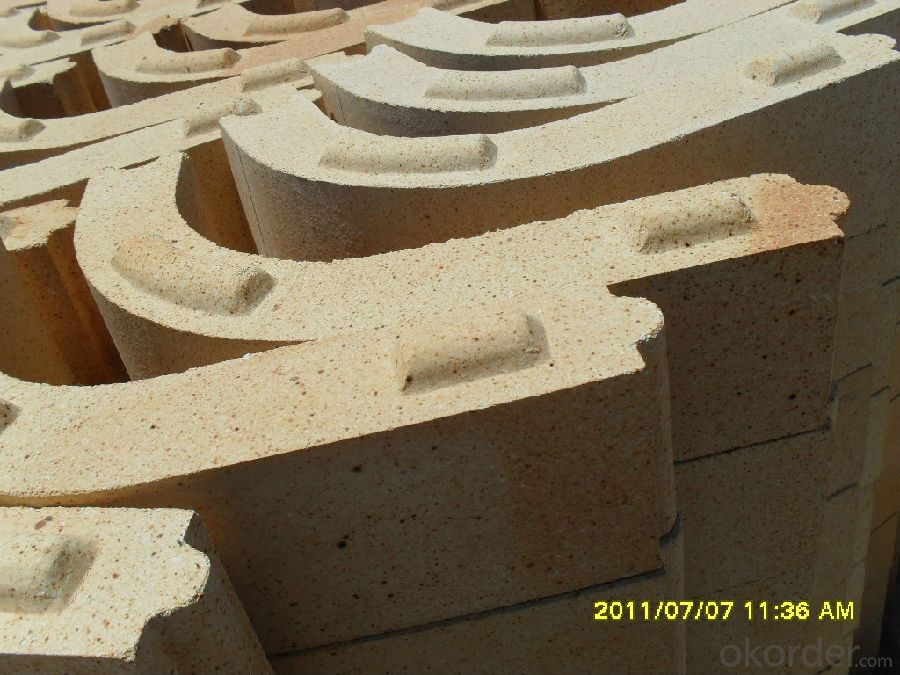
- Q: does furnace use refractory cement to make refractory bricks?
- You can use fireclay, refractory cement is commonly used to arch. fireclay has good viscidity, it is handy to use.
- Q: how much fireclay is needed for 10000 refractory bricks?
- The amount of mud used for T-3 refractory brick is 0.3KG. if the tiler is skillful, the furnace should have joint of 2mm.
- Q: when to replace the worn refractory bricks in rotary?kiln?
- But also depend on the other conditions of the furnace, many aspects should be understood, not only to see the degree of wear!
- Q: How to choose refractory brick
- The design of size and selection of refractory brick shape mainly depend on the design of industrial furnace lining . The size and shape of refractory bricks must meet the needs of furnace refractory brick masonry, it both ensures the convenience of building and usability of thermal equipment. (such as sealing, insulation, brick grade and service life etc.). When the furnace design company designs furnace lining of refractory bricks, first it should design the size of refractory bricks or choose standard size refractory bricks, sometimes this work is done by a furnace company, sometimes it is done by furnace construction?company or furnace maintenance company directly. The refractory bricks that has a certain size designed by the furnace design companies or construction companies, in addition that it should satisfy furnace operation and operation life, it also considers whether it is convenient for refractory factories to produce refractory bricks, besides, it should take into account that whether the pass rate on main production process and finished product rate is high when bricks are moulded, installed and fired. Refractory it is convenient to operate, and is convenient for refractory factory producing, the selection of shape of refractory bricks and the design of and the brick molding, and on this basis, found the relationship between the size of wedge brick, brick level and service life etc.), some even combine refractories with furnace, but each has its inherent regularity. The foreign refractory attaches great importance to building furnace, the height of furnace should be integer times of the thickness of brick (including brickwork joint)
- Q: Clay brick, red brick, always fried brick how to do?
- Clay brick and red brick are of very important quality and must not contain sand or gravel.
- Q: Which is better for tunnel kiln suspended ceiling, refractory brick or ceramic fiber module ?
- Refractory bricks is better.
- Q: What is the best color of refractory brick
- Gules
- Q: What raw materials are used for making refractory bricks
- That is silicon aluminum refractory brick/, it can be divided into five types:thermal insulation refractory brick, alkaline series refractory brick, refractory brick containing zirconium, carbonaceous refractory brick/. Refractory bricks are divided according to the ingredient of refractory. Refractory bricks are generally made from refractory clay (kaolin) or other refractory materials.
- Q: does all the refractory refer to refractory bricks when making steel?
- chamotte, castable refractory, etc are shapeless refractory, above are all ferrous metallurgy auxiliary
- Q: Are clay bricks radioactive?
- Radiation is almost invisible, radiation is almost everywhere.
Send your message to us
High Alumina Fireclay Brick (Al2O3 37%)
- Loading Port:
- Qingdao
- Payment Terms:
- TT OR LC
- Min Order Qty:
- 17 m.t
- Supply Capability:
- 10000 m.t/month
OKorder Service Pledge
OKorder Financial Service
Similar products
Hot products
Hot Searches
Related keywords
